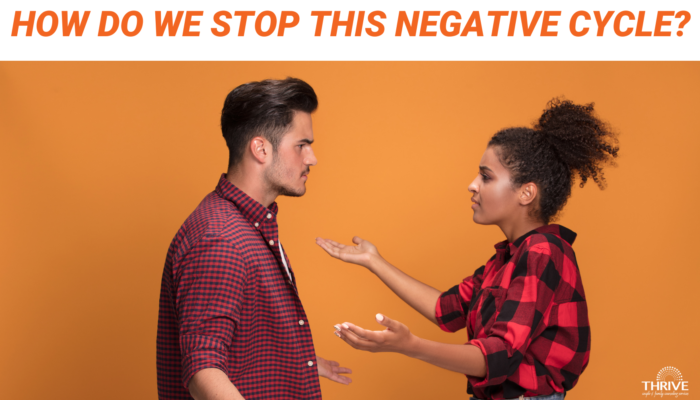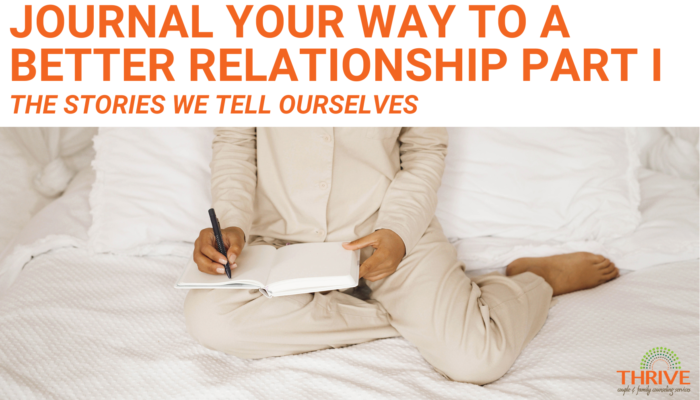Do you ever feel like you have the same argument over and over again? Does it often feel like you and your partner end up circling in fights only to end with the same outcome? Like all couples we see in our Denver Tech Center Couples Counseling offices, you may be stuck in a negative cycle.
“It’s like Groundhog’s Day every time we get upset.”
“Here we go again!”
“You do this every time!”
“He/she always yells. He/she always leaves.”
While most couples seek counseling for repetitive fights over a specific topic, like sex, child rearing or finances, most couples therapists find that regardless of the subject, the structure of the fights are the same. That’s right, it’s all the same.
As Emotionally Focused Couples therapists, it’s what we call a negative cycle, dance, feedback loop, or pattern. Many times couples will begin to come up with their own name for their negative cycle. Some common names couples use include “The Tornado,” “The Vortex,” “The Runaway Train,” etc.
How do we know when we are caught in a negative cycle?
Picture your latest arguments with your partner. Imagine if we could replay them, but this time on mute, like a silent movie. It’s probably a safe bet that those movies look the same; each partner falls into their pattern of responding, or not responding, and continues to fuel the fire.
The position each partner takes is the same every argument, and the way one postures only encourages the other to continue to posture back down the same path. You can map out your cycle like this:
The more I _____, the more you _____, and off we go. While the content may change, the process and negative cycle between you remains the same.
What are the most common negative cycles?
Couples are more susceptible to different cycles due to factors like personality, past relationships, trauma and even childhood dynamics. Each of these factors is unique to your partnership. Although, most commonly, couples fall into one of two negative cycle categories.
Find the Bad Guy
This is a negative cycle where couples blame the other for the problems, often escalating into meanness or even name-calling. Basically, each partner is finding different ways of saying, “It’s Your Fault!”
Because it requires so much constant energy, “Find the Bad Guy” often shifts to looking more like the two cycles described below as one partner loses steam. It’s feisty and energized, usually coming from couples who have more assertive or strong personalities.
As one partner calls out the other, the accused partner begins to blame back. Mutually, both couples point fingers at each other’s reactive moves and fight to be the most right.
This keeps both partners in a constant alert stance, bringing evidence against the other to prove their wrongdoing.
The more one blames, the more the other blames; round and round they go in this dead-end exchange.
Couples caught in “Find the Bad Guy” rarely talk about their true feelings, because they are basically starting each sentence with “You…” It ends up feeling terrible for both because no one feels heard, understood or cared for.
Pursue & Withdraw
This is one of the most common cycles couples get caught in. As one moves closer, the other moves farther. It’s like a non-consensual game of tag.
In this dance there is one partner, the pursuer, who fights for connection and attention to the relationship. Often they act like a first responder, sounding the alarm to a problem and attacking it head on. In essence, they protest disconnection to try to make it better.
Partners who pursue like this frequently use tone, volume and assertiveness to advocate for the relationship. However, this can often look angry and aggressive like attacking, blaming or lecturing.
The other partner in this cycle often responds very differently. This partner, the withdrawer, protects the relationship from making things worse. Underneath, they tend to feel anxious to try to fix things, but that somehow, they can’t seem to make their partner happy.
Partners who withdraw frequently use silence, leaving the room, or closed off body positioning to try to sidestep any further negative interaction. Sometimes this may look light like humor or subject changes, however, in this worst of times this can look like shutting down, dismissing or even abandoning.
The more the pursuer calls out the issue and fights to connect, the more the withdrawer gets alarmed and attempts to side step the reactivity to protect. The more they sidestep and avoid, the more the pursuer has to amp up their advocacy efforts to address. The more they amp up their protest, the more the other checks out and shuts down. This continues, and the negative cycle propels, self-sustaining.
Avoid – Avoid
This cycle is more rare. It’s silent, but deadly. While you may occasionally find two avoidant style partners together, this cycle occurs after the pursuing partner burns out and becomes too exhausted with their advocacy efforts.
In this avoid – avoid dance, both partners are withdrawn. Neither opens discussion, nor fights for connection. Silently they simmer, drifting apart. The more one becomes independent, the more the other takes that as a cue to turn away. And the more one turns away, the more other sees that as a justification to go further independent. And farther and quieter they go into disengagement.
While on the outside couples in this type of cycle may look polite and reserved, in the inside they are frequently icy cold, full of resentment and unacknowledged emotions.
This avoid-avoid cycle tends to be the more dangerous of the two, because it has often been going on for so long that both partners feel exhausted, numb and sometimes even checked out.
How do we stop cycling?
How do you defeat an enemy you don’t know?
The first step is understanding and noticing that you and your partner are in the grips of the cycle. At first, recognizing this dance can be tricky, considering it has been sneaking up on you for months, maybe even years.
Frequently couples get so caught up in their side of the dance they fail to recognize that they are falling victim to that interaction pattern. Noticing how you get trapped in the cycle can help you and your partner team up on a common enemy, instead of battling each other.
Okay, we see it happening and can call it out, what now?
The short answer–vulnerability and authenticity. The cycle exists due to a lack of deep emotional connection. Here’s where Brene Brown’s famous line, “courage over comfort” comes into play. These cycles fuel up on your reactivity to your partner, whether that’s an icy cold pull-away or a hot harsh start-up. By taking the risk and showing your partner what’s behind your reactivity, you can break this pattern.
Easier said than done though, right?
You want me to drop my weapon? You want me to resist running away? You want me to stop “manning up?”
By exploring why it feels like you need that weapon or protest sign, you can courageously start to let your partner in on your more vulnerable side.
Are you scared if you don’t fight that no one will?
Are you nervous if you didn’t, that your partner wouldn’t understand your pain and it might keep happening?
Are you afraid that if you don’t protest for connection that you will end up alone and lose your lover?
Share this.
By being brave and staying to explain your desire to run away, you can start to offer a different softer view.
Are you afraid if you spoke that things would get worse and you don’t want to lose them?
Are you scared you might say it all wrong and they might not understand you, or worse, hear you, and not want to be with you anymore?
Do you worry if you tried that you might fail and with it, the relationship?
Express this.
By allowing your partner to see your hurt and fear, you can shift the steps of the dance. Meeting your partner’s suffering with comfort and security can overpower and change this pattern.
In the end, we know all these negative cycle patterns are ineffective ways you are fighting for the connection and inadvertently missing each other.
What does a secure relationship look like?
Secure couples fight too. In fact, every couple out there has a negative cycle that is unique to their partnership. The goal of couples counseling is not to reach a point devoid of a cycle. It’s more to help you and partner know how to stay connected and what to do when that cycle strikes.
What we know from the literature is that emotional responsiveness is what keeps couples close, healthy and safe. Here’s an easy acronym from Dr. Sue Johnson, author and founder of Emotionally Focused Couples Therapy:
Accessibility: Can I reach you?
Responsiveness: Can I depend on you to be there emotionally?
Engagement: Do I know you value me enough to stay close?
Or more simply, “A.R.E. you there for me?”
Couples who begin to have these conversations strengthen their connection and secure their bond.
If you and your partner believe your relationship is falling victim to a negative cycle and you want to secure your bond, schedule an appointment with one of our Denver couples therapists at Thrive Couple and Family Counseling Services.
Stop the negative cycle in your relationship today with the help of our couples therapy specialists – call 303-513-8975, X1, or schedule online: Schedule Appointment




